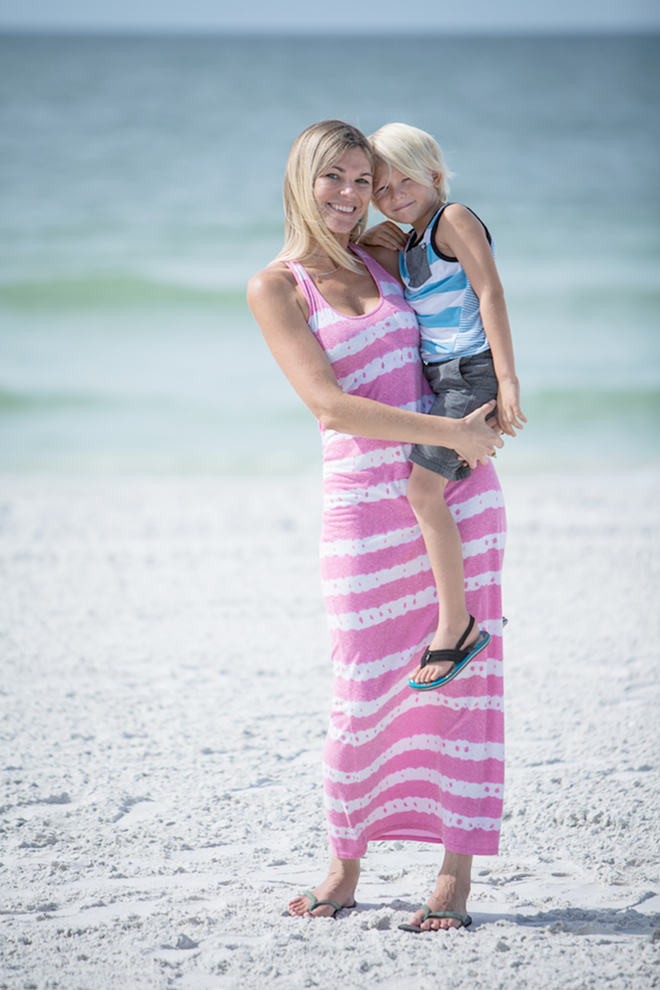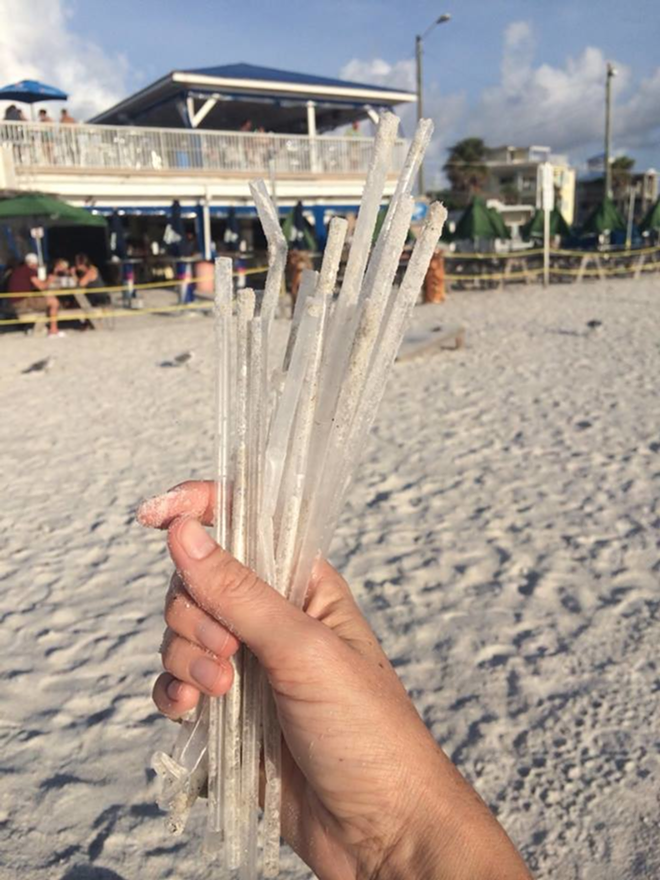
It’s hard to imagine something more mundane — forgettable, even — than the small plastic tubes hospitality employees mechanically shove into our beverages nearly every time we dine out.
It’s also hard to conceive of anything more devastating to wildlife than discarded plastic.
Having seen the notorious video of volunteers removing a plastic beverage straw from a sea turtle’s nose, Julie Featherston — a nursing student, single mother, and one-time Environment Florida organizer — decided it was time to create a viral image of her own.
That image — a fistful of sand-covered straws from a stretch of Treasure Island’s beachfront — helped spark at least one restaurant to change its straw policy, and could lead to a citywide ban on plastic straws at beachfront restaurants. It’s an agenda item for Treasure Island’s Nov. 17 City Commission workshop.
It all started one day in late September when Featherston and her 6-year-old son, Harper, were kicking around a soccer ball on the beach near Caddy’s, a popular beachfront restaurant at the northern end of Treasure Island’s Sunset Beach neighborhood.
The two usually pluck a few pieces of litter from the sand as they walk, but on this day Featherston took note of the sheer volume of clear plastic tubes. It was something of a contest: she went one way, Harper went the other.
“We came back and together we had that huge fistful of straws,” she said.
On most days, they just throw the garbage they collect into a trashcan, but on this day Featherston instead took a photo of Harper’s hand clenching the straws with Caddy’s in the background (Featherston dispensed a healthy dose of hand sanitizer afterward, she said), posted it to social media and tagged the restaurant. Caddy’s staffers clean the beach regularly, but the rake they use can’t catch the straws.
“They rake the beach, [the straws] don’t get cleaned up, they get inadvertently tipped out of drinks, blown out, taken away by the tides, and nobody really realizes it,” Featherston said.
Over the course of the next day or so, the image was shared thousands of times on Facebook.
By the following afternoon, Caddy’s had announced a change in its straw policy; the restaurant replaced all of its plastic straws with paper and serves straws only at the customer’s request.
The paper straws cost roughly eight times more than the plastic ones — about four cents apiece, which the restaurant is absorbing rather than raise its drink prices.
“In a lot of things we do in our day-to-day lives, we just overlook certain things,” said Ken Hautmann, general manager of Caddy’s. “We thought we were doing a good job taking care of the environment. Harper and Julie brought this to our attention and we jumped right on board.”
Overall, he said, the new policy has gone over well. There have been one or two complaints, but overall the reaction has been positive.
Featherston believes that most people really do want to get away from using single-use plastics. “This is something people really want to get on board with,” she said. “And we need some good news.”
Featherston’s efforts aren’t ending with a voluntary straw ban at Caddy’s. She’s hoping the Don CeSar on St. Pete Beach will follow suit, and is working with environmental groups to convince the Treasure Island City Commission to pass a ban on plastic straws for all of the city’s waterfront restaurants and bars. Her campaign is called Be. Plastic. Free.
“If you don’t have beaches that are protected and clean and pristine, then people aren’t going to come here,” said Thomas Patarek, an activist with the Suncoast Surfrider Foundation, which recently launched its Beyond Plastics campaign to raise awareness of single-use plastics’ impact on the health of our oceans. “Therefore, it’s going to hurt not just the oceanfront businesses, but everyone in the
surrounding area.”
The city initially opted for voluntary bans, but some commissioners want to pass an ordinance with teeth.
“It should be a no-brainer,” said Treasure Island City Commissioner Alan Bildz, whose district comprises Sunset Beach. “Will there be pushback? Of course there’ll be pushback. It’s ridiculous.”
Opposition to the ban will likely include some restaurants that don’t like being told to change their ways. Hautmann, the Caddy’s GM, likes the flexibility of a voluntary ban.
“My personal view is that we should be held responsible to do the right thing and that we don’t need a law for every little thing that comes up,” he said. “Let’s be responsible adults. When I heard about it, I said, 'let’s step up to the plate.'”
The Tampa Bay Beaches Chamber of Commerce wants to focus on education.
“This is a burden that we not only need to put on our businesses, but we also need to educate our consumers and our visitors,” said Robin Sollie, head of the chamber. “Because they can get a straw at 7-11 and bring a drink to the beach and it has nothing to do with Caddy’s or Sloppy Joe’s or any of them.”
If the proposed ban clears the Tuesday workshop, it would have to pass two commission hearings. If it passes, there’s always the possibility that state lawmakers could negate it with a bill preempting such bans at the local level, as it did with plastic bag bans in larger cities across the state.
“It’s always going to be in the back of your head that the [Florida] Chamber of Commerce is going to get together with its favorite cronies and the state would pass something, but I haven’t heard anything,” Bildz said.
Featherston has set up an online petition to help compel the city to pass the ban, citing the millions of tons of plastic debris that pollute our waterways each year, debris that never goes away.
Straws are a small part of the problem, she acknowledges, but focusing on their impact helps generate a broader dialogue about
consumer behavior.
“It’s concentrating on something that is so easy to fix,” she said, “and it starts a conversation.”


